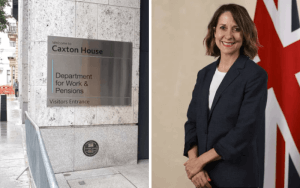The Department of Health and Social Care (DHSC) has been ordered to release missing parts of a document that warned national power cuts could cause “catastrophic deterioration” in some disabled people who rely on medical equipment in their own homes.
Although the department released parts of the unfinished report earlier this year, it redacted significant parts of the document and then refused to release those sections when Disability News Service (DNS) complained*.
Now the information commissioner has ordered DHSC to release the missing parts of Rolling Power Outages: Medical Equipment and Vulnerable People, which the government describes as an “internal scoping paper”.
It has 30 days to release the information, although it could still appeal to the information rights tribunal.
The scoping paper considered what advice was available for disabled people who rely on mains-powered medical devices at home and whether there was a need for DHSC to issue its own guidance.
But DHSC decided not to draw up any guidance and to leave it to individual disabled people and their “care teams” to draw up plans for “how they can prepare for and respond to loss of power to their home”, with the paper suggesting they should “take individual responsibility for their own preparedness”.
That conclusion was reached even though the document makes clear that some disabled people could be “at very high risk of catastrophic deterioration” if the power cut was unexpected or continued for longer than their equipment’s batteries lasted.
The paper also admitted that there were significant flaws with the system of local priority services registers (PSRs), which are supposed to ensure energy companies provide “enhanced support to their more vulnerable customers”.
It warned that there were “barriers” that prevented many of those eligible from signing up to a PSR, while there was “an issue” with knowing how many devices supporting people with “the more critical conditions” were being used in people’s homes.
The scoping paper also admitted that “in a national power outage scenario it would not be possible to notify PSR households pre-emptively” that they were about to lose electricity.
And it stated that in a “reasonable worst-case scenario” in at least some types of “national power outage”, services such as providing emergency power to those on the PSR who rely on “at home medical equipment” would “not be available due to the scale and complexity of the outage”.
The attempt to secure the missing information from the scoping paper was the latest effort by DNS over the last two years – in the face of resistance from the last Conservative government – to find out what plans ministers had put in place to protect people who rely on equipment such as ventilators, oxygen concentrators and dialysis machines in the event of a major blackout.
It is not yet clear if the new Labour-run DHSC will take a different position in response to these efforts.
DHSC released only a redacted version of the paper earlier this year, arguing that it was unfinished, and that parts of it were “intended for internal use and taken out of context or in isolation are open to misinterpretation which could cause misunderstanding”.
Although it admitted that there was a public interest argument for releasing the redacted information, it said this was outweighed by other factors, including the need to protect internal communications.
It also argued that releasing the missing information “could lead to a chilling effect between officials as they collaborate across government to develop plans for risks”, and it said that redacted figures provided by Ofgem were “more than 18 months old” and had “not been quality assured”.
And it said it had launched a new website to support the public in planning for emergencies, which included advice for disabled people and information on what to do in a power outage.
But the website includes no new information for disabled people who rely on medical equipment at home, relying instead on DHSC’s previous position that they should “make a plan” in advance with their “care provider, clinical care team and/or equipment supplier”.
Despite DHSC’s arguments, the information commissioner, John Edwards, concluded in his decision notice that the department’s arguments for preventing the release of the redacted information were outweighed by the public interest in disclosing it to DNS.
He said there were “significant public interest arguments in favour of disclosure” at the time the request was made in January.
DHSC had not commented on the decision notice by 11am today (Thursday) or said if it would release the redacted information.
*The complaint was dealt with under the Environmental Information Regulations, rather than the Freedom of Information Act
Picture: DHSC’s Whitehall offices
A note from the editor:
Please consider making a voluntary financial contribution to support the work of DNS and allow it to continue producing independent, carefully-researched news stories that focus on the lives and rights of disabled people and their user-led organisations.
Please do not contribute if you cannot afford to do so, and please note that DNS is not a charity. It is run and owned by disabled journalist John Pring and has been from its launch in April 2009.
Thank you for anything you can do to support the work of DNS…

 Ministers are secretly considering means-testing PIP, DWP admits, despite pledge in green paper
Ministers are secretly considering means-testing PIP, DWP admits, despite pledge in green paper Tribunal allows DWP to continue to hide information from secret reviews into universal credit deaths
Tribunal allows DWP to continue to hide information from secret reviews into universal credit deaths DWP’s unlawful silence on ‘critical friend’ report raises questions over minister’s transparency pledge
DWP’s unlawful silence on ‘critical friend’ report raises questions over minister’s transparency pledge